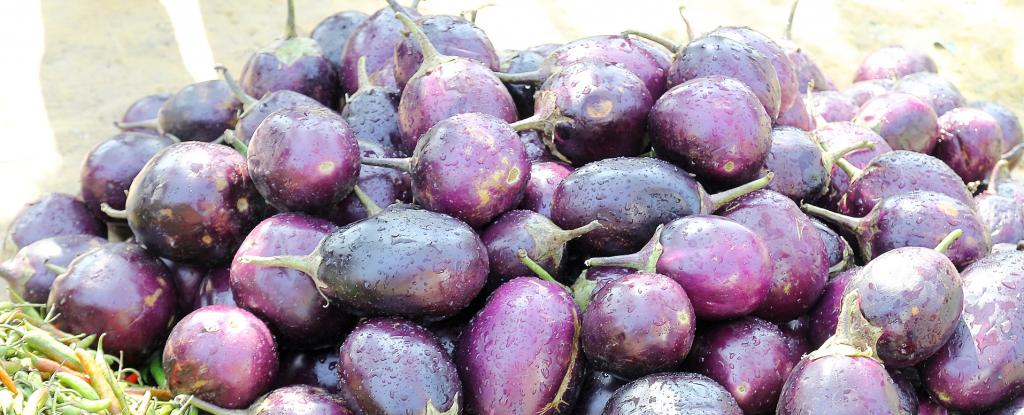

The Event 142 variety of genetically modified brinjal was quietly approved for field trials without any data in the public domain, claim experts



Experts have slammed a recent move of the Genetic Engineering Appraisal Committee (GEAC) — a government-appointed committee responsible for appraisal of proposals of genetically engineered organisms — giving its greenlight for biosafety research-level-II (BRL-II) field trials for Event 142, a new variety of genetically modified brinjal (Bt brinjal) during its 139th meeting May 19, 2020.
The experts have alleged regulatory lapses over giving such an approval. Bihar, Chhattisgarh, Jharkhand, Karnataka, Madhya Pradesh, Odisha, Tamil Nadu and West Bengal are now allowed to conduct trials for Event 142. This variety was developed by Polumetla Anand Kumar and the National Research Centre for Plant Biotechnology of the Indian Agriculture Research Institute.
Why this is a matter of concern
This new variety of genetically modified brinjal was quietly given approval without any data in the public domain, said several experts who spoke at an August 27 webinar organised by the Coalition for a GM-Free India, a collective of non-profits campaigning against genetically modified products.
This paved the way for crop developers and applicants to seek permission for commercial cultivation, the experts said. There was no transparency in the manner when it came to reports regarding the biosafety of this variety of brinjal, they added.
“Regulators found time to have a virtual meeting and approve trials for Event 142, when the country was in the grip of a lockdown,” Kavitha Kuruganti, associated with the Coalition for a GM-Free India collective, said during its webinar August 27. “This variety got approved even before the second season BRL-II and the biosafety report was out. It was claimed that everything was safe,” she added.
Kumar — the developer of the variety — was also a regulator at the GEAC from 2006 till July 2011, while his product was before the committee. This was a serious conflict of interest that plagued India’s regulatory regime from the beginning, said Kuruganti.
A labelling regime for the products cannot work as most products in India were sold unpacked in an open manner, said GV Ramanjaneyulu, executive director at the Centre for Sustainable Agriculture, Telangana. “Right to safe food is a fundamental right and GM foods like Bt Brinjal reaching the markets violates consumer rights,” he said.
Does India need Bt brinjal?
India was the centre of origin and the centre of diversity for brinjal, as it had more than 3,600 accessions — a group of related plant material from a single species which is collected at one time from a specific location to assess diversity — said Ramanjaneyulu.
“Like Bt cotton, developers claimed they developed this variety to target the shoot borer pest and increase yield. But the pest is not the problem for a brinjal farmer. The price offered for the crop is,” he added.
The same issues were pointed out when Bt cotton was introduced, with developers claiming it would target the pink ball worm pest. The Bt technology worked initially, but the pink ball worm became resistant to the Bt toxin within five years, according to Ramanjaneyulu.
Similarly, even if the Bt brinjal gets commercialised, the lifespan of the technology would be just five years, he claimed.
After considering the health and environmental impacts of the previous Bt brinjal variety (Event EE1), it was not allowed to be cultivated in India, with a moratorium ordered in 2010. This variety was developed by Mahyco Monsanto Biotech (India) Pvt Ltd, a joint venture between Maharashtra Hybrid Seeds Co and Monsanto Investments India Pvt Ltd.
The GEAC has now, however, gone ahead with trials for Event 142, stating the earlier moratorium had no implications for this variety, said Kuruganti. Illegal cultivation of Bt brinjal started in April 2019 in Haryana’s Fatehabad, with the National Bureau of Plant Genetic Resources confirming this, but ruling out Mahyco’s variety, she claimed.
Bangladesh’s experiment
Bangladesh, however, has become an example of how Bt Brinjal failed, with the country’s story similar to India’s, where an approval was given without any data in the public domain.
The first round of the seed was distributed in January 2014, with the second round beginning in September 2014-15. Six rounds of seeds were distributed till 2018-19, said Farida Akhter, executive director of non-profit Unnayan Bikalper Nitinirdharoni Gobeshona (UBINIG) based out of Bangladesh.
UBINIG, in a study, found the claims made for Bt brinjal were false, as feedback from farmers after the first and second rounds of seed distribution were not promising.
The farmers lost between 15,000 and 30,000 Bangaldeshi Taka (approximately Rs 13,011 and 26,022), while local varieties earned between 70,000 BDT and 100,000 (Rs 60,718 and 86,740), according to Akhter.
Farmers were promised ‘no pest attack, no pesticide use’ along with a higher yield and income. This, however, was not the case as major pests observed in the Bt Brinjal field included viruses, fungus, insects and mites. Around 35 types of pesticides were used to control the pest, she added.
We are a voice to you; you have been a support to us. Together we build journalism that is independent, credible and fearless. You can further help us by making a donation. This will mean a lot for our ability to bring you news, perspectives and analysis from the ground so that we can make change together.

Comments are moderated and will be published only after the site moderator’s approval. Please use a genuine email ID and provide your name. Selected comments may also be used in the ‘Letters’ section of the Down To Earth print edition.